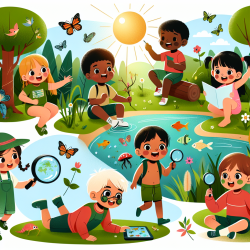Embracing Nature for Child Development: Evidence-Based Insights
In the realm of speech-language pathology, creating optimal outcomes for children is paramount. Recent research, as highlighted in the study "Associations between Nature Exposure and Health: A Review of the Evidence," offers compelling insights into how exposure to nature can enhance various health outcomes, including cognitive function and mental health. This blog delves into how practitioners can leverage these findings to improve therapeutic outcomes for children.
Key Findings from the Research
The research underscores several health benefits associated with nature exposure, particularly for children and youth. Key outcomes include:
- Improved Cognitive Function: Exposure to natural environments has been linked with enhanced attention and executive function, which are crucial for learning and development.
- Better Mental Health: Nature exposure is associated with reduced anxiety and depression, promoting a positive emotional state.
- Increased Physical Activity: Access to green spaces encourages physical activity, which is vital for physical health and cognitive development.
- Enhanced Sleep Quality: Natural settings can improve sleep quality, which is essential for cognitive processing and emotional regulation.
Implementing Nature-Based Strategies in Therapy
Practitioners can integrate nature exposure into their therapeutic approaches in several ways:
- Outdoor Therapy Sessions: Conducting sessions in natural settings can enhance engagement and therapeutic outcomes.
- Incorporating Nature Elements: Use of nature-themed materials and activities can stimulate cognitive and emotional growth.
- Virtual Nature Experiences: For remote therapy, virtual nature experiences can provide similar benefits as physical exposure.
Encouraging Further Research
While the current evidence is promising, there is a need for more research, particularly longitudinal studies, to understand the long-term impacts of nature exposure on child development. Practitioners are encouraged to contribute to this growing field by incorporating nature-based interventions and documenting outcomes.
Conclusion
Integrating nature exposure into therapeutic practices offers a data-driven approach to enhancing child development. By embracing the natural world, practitioners can foster better cognitive, emotional, and physical health outcomes for children.
To read the original research paper, please follow this link: Associations between Nature Exposure and Health: A Review of the Evidence.










